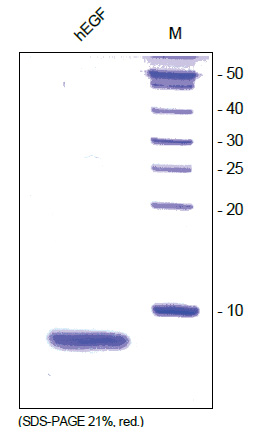EGF Human Protein
Other products for "EGF"
Specifications
| Product Data | |
| Species | Human |
| Expression Host | E. coli |
| Expression cDNA Clone or AA Sequence |
MNSDSECPLSHDGYCLHDGVCMYIEALDKYACNCVVGYIGERCQYRDLKWWELR
|
| Predicted MW | 6.35 kDa |
| Purity | >95% by SDS-PAGE & Silver stain |
| Buffer | Presentation State: Purified State: Lyophilized purified protein Buffer System: PBS Stabilizer: None |
| Bioactivity | Biological: The biological activity was determined by the ability to induce EGF receptor phosphorylation in the A431 tumor cell line [Soler et al, J Chromatography B, 788, 2003] and the induction of proliferation in NHDF cells (Normal Human Dermal Fibroblasts). |
| Reconstitution | We recommend a quick spin followed by reconstitution in water to a concentration of 0.1-1.0 mg/ml. This solution can then be diluted into other aqueous buffers and stored at 4°C for 1 week or -20°C for future use. |
| Preparation | Lyophilized purified protein |
| Protein Description | Recombinant Human EGF. N-terminal seq: MNSDSECPLS |
| Note | Centrifuge vials before opening! |
| Storage | Store lyophilized at 2-8°C for 6 months or at -20°C long term. After reconstitution store the antibody undiluted at 2-8°C for one month or (in aliquots) at -20°C long term. Avoid repeated freezing and thawing. |
| Stability | Shelf life: one year from despatch. |
| Reference Data | |
| RefSeq | NP_001171601 |
| Locus ID | 1950 |
| UniProt ID | P01133 |
| Cytogenetics | 4q25 |
| Synonyms | HOMG4; URG |
| Summary | 'This gene encodes a member of the epidermal growth factor superfamily. The encoded preproprotein is proteolytically processed to generate the 53-amino acid epidermal growth factor peptide. This protein acts a potent mitogenic factor that plays an important role in the growth, proliferation and differentiation of numerous cell types. This protein acts by binding with high affinity to the cell surface receptor, epidermal growth factor receptor. Defects in this gene are the cause of hypomagnesemia type 4. Dysregulation of this gene has been associated with the growth and progression of certain cancers. Alternative splicing results in multiple transcript variants, at least one of which encodes a preproprotein that is proteolytically processed. [provided by RefSeq, Jan 2016]' |
| Protein Families | Adult stem cells, Druggable Genome, Embryonic stem cells, ES Cell Differentiation/IPS, Induced pluripotent stem cells, Transmembrane |
| Protein Pathways | Bladder cancer, Cytokine-cytokine receptor interaction, Endocytosis, Endometrial cancer, ErbB signaling pathway, Focal adhesion, Gap junction, Glioma, MAPK signaling pathway, Melanoma, Non-small cell lung cancer, Pancreatic cancer, Pathways in cancer, Prostate cancer, Regulation of actin cytoskeleton |
Documents
| FAQs |
Resources
Recombinant Protein Resources |
{0} Product Review(s)
0 Product Review(s)
Submit review
Be the first one to submit a review
Product Citations
*Delivery time may vary from web posted schedule. Occasional delays may occur due to unforeseen
complexities in the preparation of your product. International customers may expect an additional 1-2 weeks
in shipping.






























































































































































































































































 Germany
Germany
 Japan
Japan
 United Kingdom
United Kingdom
 China
China
